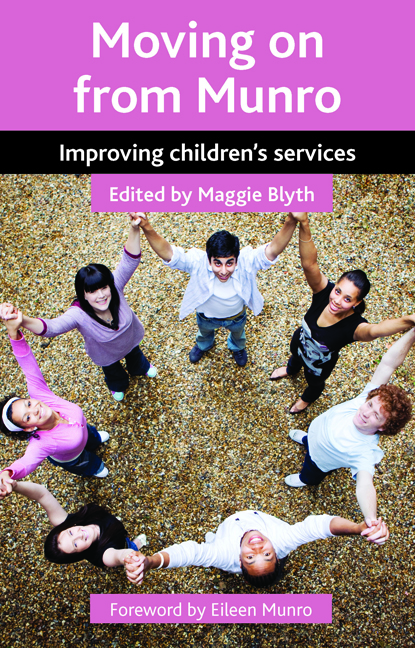Book contents
- Frontmatter
- Contents
- List of abbreviations
- Notes on contributors
- Acknowledgements
- Foreword
- Introduction
- 1 Getting the right things right
- 2 Child protection: 40 years of learning but where next?
- 3 Doing something different: reconfiguring front-line services: opening up the market
- 4 Re-imagining early help: looking forward, looking back
- 5 Children should be seen and heard: understanding the child’s experience
- 6 Responding to adolescent risk: continuing challenges
- 7 Moving on with Munro: child sexual exploitation within a child protection framework
- 8 Missing children post-Munro
- 9 Symbolic half-measures? On local safeguarding children boards, their contributions and challenges
- Conclusion
- Index
Introduction
Published online by Cambridge University Press: 03 February 2022
- Frontmatter
- Contents
- List of abbreviations
- Notes on contributors
- Acknowledgements
- Foreword
- Introduction
- 1 Getting the right things right
- 2 Child protection: 40 years of learning but where next?
- 3 Doing something different: reconfiguring front-line services: opening up the market
- 4 Re-imagining early help: looking forward, looking back
- 5 Children should be seen and heard: understanding the child’s experience
- 6 Responding to adolescent risk: continuing challenges
- 7 Moving on with Munro: child sexual exploitation within a child protection framework
- 8 Missing children post-Munro
- 9 Symbolic half-measures? On local safeguarding children boards, their contributions and challenges
- Conclusion
- Index
Summary
About this book
It is evident that the harm that children can suffer from living in families with complex problems cannot be prevented by the social care system alone. There must also be a coordinated response from a range of services, including health, police, schools, national policy makers and communities themselves. Together, they must create an environment that supports and nurtures families and challenges and intervenes to prevent unacceptable behaviour. (Ofsted, 2013a, p 10)
Part 1: Introduction and context
Protecting children from harm is far from straightforward. During 2013/14 we have seen an increased and nationwide focus on the tragic deaths and serious injuries of children across the country and arguably more awareness of the risks facing young people in relation to sexual exploitation and sexual abuse. The public insistence that children should be safe and an understandable shock at the tragic circumstances in which some children die or are seriously harmed has been exacerbated by the number of high-profile serious case reviews (SCRs) published during 2013 (eg Daniel Pelka, Coventry; Keanu Williams, Birmingham; Hamza Khan, Bradford). Of the 133 SCRs under way in November 2013, it is expected that 94% will be published (Association of Independent Chairs of LSCBs, 2013). At best, this has allowed a candid dialogue about the challenges facing front-line professionals and organisations tasked with protecting children from maltreatment and poses fundamental questions for us as a society. At its worst, the requirement to publish SCRs has led to a tide of disquiet from the media and public, suggesting that the focus of these inquiries on ‘learning lessons’ has become a meaningless mantra. The alarming failures within the system when information is not shared, when teachers, GPs, paediatricians and police officers, as well as social workers, fail to recognise abuse and act swiftly, have become the central story. The fact that in the cases outlined earlier adults deliberately sought to hurt children in their care and ultimately cause their deaths, while successfully deceiving professionals, is a fundamental message lost in most reporting. Instead, criticism has fallen on local authorities, and social care departments in the main, which, as well as dealing with increased workloads, are faced with rapidly diminishing resources.
- Type
- Chapter
- Information
- Moving on from MunroImproving Children's Services, pp. 1 - 10Publisher: Bristol University PressPrint publication year: 2014

